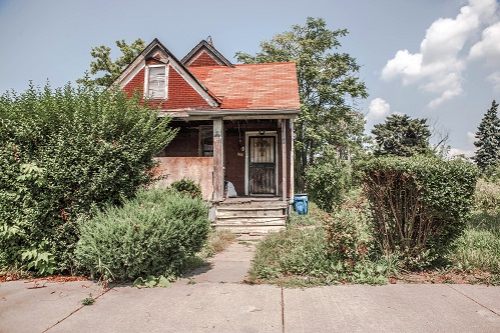- How does renters insurance work?
- What does renters insurance cover?
- Renters insurance coverage: Myths vs. facts
- Optional renters insurance coverages
- What isn’t covered by renters insurance?
- Renters insurance policy vs. landlord's insurance: What's the difference
- Replacement cost vs. actual cash value: Which renters insurance coverage is better?
- How much does renters insurance cost?
- How much renters insurance coverage do you need?
- Are there renters insurance endorsements for high-value items?
- FAQ: Renters insurance
How does renters insurance work?
Renters insurance covers your belongings in a home you rent, whether it's an apartment, a townhouse or a single-family home. It also protects you from liability claims for injuries or damage to someone else and provides additional living expenses coverage.
The main difference between renters insurance and homeowners insurance is that renters doesn’t include coverage for the building. That makes renters insurance much cheaper.
A renters insurance policy may also be called tenant insurance, and insurance companies refer to it as an HO-4 policy.
People ask
What is the minimum required renters insurance coverage?
There is no minimum requirement for renters insurance, as it's not required by law anywhere. Your landlord, however, may require it.
What does renters insurance cover?
Basic renters insurance includes three primary coverages. Here’s a summary.
| Coverage type | What it covers | Example |
|---|---|---|
| Personal property | Your property; all of the contents of your home that you own | There's a break-in. and your TV is stolen |
| Personal liability | Injuries or damages to others for which you are responsible | A guest slips on your kitchen floor and is injured |
| Additional living expenses (ALE) | Temporary living expenses when you can't live at home due to a covered loss | You have to stay in a hotel after a fire while your house is repaire |
Now, let's look at the details of each.
Personal property coverage
The personal property portion of your policy covers all your belongings, from your sheets to your big-screen TV. Without a renters policy, there is no coverage for anything you own.
You can choose the renters insurance coverage amount for personal property based on an estimation of the value of your property.
Renters insurance will cover your belongings anywhere in the world, not just in your home. If your laptop is stolen from your car, car insurance won’t cover it, but renters' insurance will. However, there are limitations to coverage outside the home, usually 10% of the overall personal property coverage.
Standard renters insurance coverage is what insurance companies call a broad form policy. That means it’s a named perils policy – it covers you for the perils listed, and anything not listed is excluded.
Some of the perils covered by a broad form policy include:
- Fire
- Lightning
- Explosion
- Smoke
- Vandalism
- Theft
- Water-related damage from sudden and accidental discharge
Like all home insurance policies, there are special limits on certain types of personal property, like jewelry, art, musical instruments and cash or valuable papers. These have a specified limit of up to $2,500, depending on the property type.
If you have high-value items that fall into these categories, you can purchase additional coverage, called a scheduled personal property endorsement (floater), that will cover individual items for their appraised value.
Personal property coverage is subject to a deductible, which you can select when you purchase the policy.
Personal liability coverage
Personal liability insurance for renters covers you when you’re at fault for injuries to someone else or for damage to their property. If someone slips on your kitchen floor and is injured or if your child throws a ball through a neighbor’s window, liability insurance will pay the bill.
Tenants insurance liability coverage is included with your policy. The standard liability limit is $100,000, but you can choose coverage of up to $500,000. Experts recommend at least $300,000.
In addition to the liability coverage in your insurance policy, renters insurance also has no-fault medical coverage called medical payments coverage.
"If someone gets hurt in your home, [they] can submit medical bills directly to your insurance company,” says Angi Orbann, Vice President of property, personal insurance property at Travelers. “This way, expenses can be paid without a liability claim being filed against the renter. It should be noted that this coverage does not pay the medical bills for the renter's own family."
Typically, coverage amounts are between $1,000 and $5,000.
Additional living expenses coverage
Renters insurance also includes additional living expenses (ALE). This coverage, also known as loss of use, pays living expenses if a covered claim forces you out of your home during repairs.
"Additional living expenses on an HO-4 would cover costs associated with hotels, meals, laundry and other expenses that the tenant incurred while their apartment was being repaired, says Travis Biggert, chief sales officer with Hub International, an insurance brokerage.
ALE coverage could also cover costs associated with moving should the apartment not be habitable for an extended period.
People ask
Does renters insurance cover appliances?
Not unless you own them. Renters insurance doesn't cover anything owned by your landlord. If you have bought your own appliances, keep receipts in case of a claim.
Renters insurance coverage: Myths vs. facts
There's a lot of confusion regarding how renters insurance works. We bust some common myths here.
Myths vs. Facts: Renters Insurance
Optional renters insurance coverages
You can enhance your renters insurance policy with additional coverage if you choose to do so. There are a few common renters insurance coverage options:
- Personal property replacement cost. Covers your personal property at replacement cost value rather than depreciated value.
- Earthquake coverage. You may be able to add an endorsement for earthquake damage, which is otherwise excluded.
- Scheduled personal property. Insures high-value items for their appraised value.
- Flood insurance. This is a separate policy that is available to renters through the National Flood Insurance Program.
What isn’t covered by renters insurance?
Renters insurance has some exclusions you should be aware of. First, anything not listed as a covered peril is automatically excluded. But there are a few other things that are more specifically excluded. They include:
- Floods
- Earthquakes
- War and nuclear disasters
- Pests, including bugs and animals
- Intentional damage
You will need a separate policy if you live in an area prone to flooding or earthquakes. Flood insurance is available from the National Flood Insurance Program, and earthquake coverage can usually be added as a rider to your policy.
It’s also important to note that while your policy covers family members living with you, roommates are not. Depending on the insurance company's rules, you might be able to share a policy with your roommate.
Does renters insurance cover property damage?
Renters insurance covers damage to your personal property as long as it is caused by a covered peril. It will also cover property damage to others if you are responsible under your personal liability coverage. It does not cover damage to the landlord's property caused by anything out of your control. Your landlord mus have their own policy to cover the structure and their property.
Renters insurance policy vs. landlord's insurance: What's the difference
A landlord's policy is very different from a renters insurance policy. Here's a breakdown:
| Coverage | Renters | Landlord |
|---|---|---|
| Building structure and other structures on the property | No | Yes |
| Tenant's personal property | Yes | No |
| Liability | For the tenant | For the landlord |
| Loss of rent | No | Yes |
| Additional living expenses | Yes | No |
Replacement cost vs. actual cash value: Which renters insurance coverage is better?
Most types of renters insurance use actual cash value to calculate how much the company will pay for your items if they’re stolen or destroyed. However, you can choose to upgrade your policy to replacement cost coverage.
Actual cash value policies consider depreciation when calculating the value of your possessions. Your insurer will only pay out the equivalent of the belongings' value at the time of the loss. Actual cash value is calculated as the replacement cost of the item new minus depreciation. So, if you have a 10-year-old TV that is stolen, the insurance company would pay for the replacement cost of a similar TV minus 10 years worth of depreciation (and minus the deductible.)
These policies are less expensive, but remember that you will have to cover the difference between what your policy pays and the cost of replacing your possessions with new ones.
Replacement cost coverage reimburses you for the actual cost of replacing your possessions. For example, if your TV is destroyed, your insurer will replace it with a brand-new TV of a similar size and quality. This coverage ensures you receive the full cost to replace your possessions rather than the depreciated value.
You will pay a little more for this coverage, this is a highly recommended renters insurance coverage.
How much does renters insurance cost?
How much does a renters policy cost per month for an apartment or a house? Surprisingly, not much – it’s less than $23 a month.
The national average yearly cost for a policy with coverage levels of $40,000 for personal property, a $1,000 deductible and $300,000 of liability protection is $270 or about $23 a month.
Here's a look at rates by coverage level:
| Coverage limits | Annual premium | Monthly premium |
|---|---|---|
| $20,000 property/$100,000 of liability | $193 | $16 |
| $20,000 property/$300,000 of liability | $209 | $17 |
| $40,000 property/$100,000 of liability | $270 | $23 |
| $40,000 property/$300,000 of liability | $288 | $24 |
| $60,000 property/$100,000 of liability | $347 | $29 |
| $60,000 property/$300,000 of liability | $366 | $31 |
Renters insurance rates will vary depending on the amount of personal property coverage you need. They’re also affected by where you live.
How much renters insurance coverage do you need?
Whether you need apartment renters insurance for your first place or you’re renting a home with your family, the needs of tenants vary through life’s stages. Below, we provide advice for each stage with sample coverage and rates.
| Coverage level | Home size | Coverage example | Best for |
|---|---|---|---|
| Minimum coverage | Rented room or small apartment | $20,000 personal property $100,000 liability $500 deductible Cost: $209/year | College students, first apartment |
| Mid-level coverage | Larger apartment or small house | $40,000 personal property $300,000 liability $1,000 deductible Cost: $288/year | Single people or couples, starter homes |
| Higher renters coverage | Medium to large house | $60,000 personal property $300,000 liability $1,000 deductible Cost: $366/year | Families renting a larger home, singles or couples with a lot of personal property |
Are there renters insurance endorsements for high-value items?
A standard renters insurance policy includes coverage for jewelry and other high-value items (furs, watches, and collectibles, among other items). But there are limits on how much your policy covers, which is specified in the contract. For example, the Insurance Information Institute (III) notes that in a typical policy, stolen jewelry is only covered up to $1,500.
Just like homeowners insurance endorsements, renters insurance offers endorsements (or riders) for high-value items. You’ll need an appraisal to prove the value of each item.
"These valuable items need to be 'scheduled,' which means a separate (endorsement) policy for each item," explains III spokesperson Lynne McChristian. "For instance, insurance for jewelry is about one to two percent of the value of the item, so insuring a $50,000 diamond ring could cost between $500 and $1,000 annually."
She adds that "you have the opportunity to select which deductible works best for you and your budget, and the higher the deductible amount means the lower your policy cost (for the endorsement). But it does mean you pay more out-of-pocket if you have a loss."
Methodology
We partnered with Quadrant Information Services to field renters insurance rates across all 50 states and Washington, D.C. National averages are based on:
- $40,000 in personal property coverage
- $300,000 in liability coverage
- $1,000 deductible
- Good credit
Additional data is gathered for:
- Personal property limits of $20,000 and $60,000
- Liability limits of $100,000
- A $500 deductible
Learn more about our data and methodology.
FAQ: Renters insurance
Does renters insurance cover hotel stays?
Yes, if you can't live at home due to a covered loss, renters insurance includes loss of use coverage for hotel costs.
Does renters insurance cover lost items?
No. If you lose something, it's not covered by renters insurance. However, loss (mysterious disappearance) is covered if you have a scheduled personal property endorsement, but only for the items listed.
Does renters insurance cover theft?
Yes, renters insurance covers theft of your items either from your home or anywhere else, like your car or a hotel room. You must file a police report for the theft to be covered.
Does renters insurance cover accidental damage?
No, accidental damage is generally not covered. If you drop your TV while hanging it on the wall, it's not covered by renters insurance.




